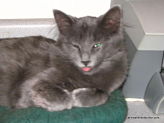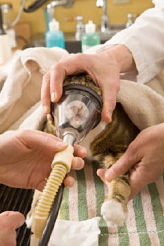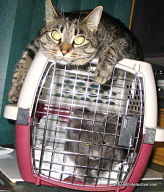Cat Surgery

Cat Surgery...should your cat have surgery? This is a serious question and you need to weigh the risks such as the age of your cat, what complications could happen from the anesthesia, how likely are the complications? What will be done for pain relief before, during and after surgery. It is important to ask your vet these questions. Also, what is the projected outcome of the surgery and how much will it cost?
Surgery falls into two main categories. Surgery that is required to maintain your cat's health that is elective and non-urgent... and emergency surgery that is necessary and has to be done immediately. So basically, the emergency surgery is to remove something or repair something.
Cats sometimes swallow harmful items and need surgery like when a sewing needle and thread, string or Christmas tinsel get swallowed. Such an item can loop under a cat's tongue and the cat swallows the ends which can do damage internally.
Cats can develop bladder stones or urethral stones (stones in the urine carrying tube from the bladder) and may need surgery to remove them. Urethral stones can block the flow of urine through the penis of a male cat causing severe illness. In very severe cases during cat surgery the penis is amputated but that is less common now that specially formulated diets can dissolve some types of bladder stones.
Occasionally, cats need hernia repairs. Some cats are born with umbilical hernias, a birth defect in which a loop of intestine balloons out against the skin at the point where the umbilical cord was attached. During cat surgery, intestinal loops are reinserted and the body wall repaired.
Another condition that may require cat surgery is mega-colon a neuromuscular disorder causing enlargement of the colon. It causes cats to become very constipated. In the most severe cases treatment may involve removing the colon.
Young cats typically have cat surgery for neutering and spaying. Older cats sometimes develop soft tissue sarcomas, malignant tumors that appear as lumps in the muscle or fat just below the skin on the legs, trunk, abdomen, head or neck. While cat surgery may help in a return to a good life, it is not without risk.
Surgeries that involve the abdominal cavity, the lungs, or the brain are riskier because they expose vital organs. Minor surgery like a tooth extraction or a skin biopsy are less risky. Before agreeing to surgery have an honest talk with your vet about the risks and benefits so you can make a realistic decision.
Prior to surgery your vet will use x-rays or other imaging devices to pinpoint the extent of the problem. Your cat will have a physical exam and the vet may run other tests depending on your cat's age and health. A complete blood count will check the numbers of red and white blood cells and other blood tests establish how well the liver and kidneys are working. The tests for liver and kidney function enable your vet to make a decision about which anesthesia to use and how much.
Other tests may reveal abnormalities in the concentration of lectrolytes...chemical substances such as sodium and potassium that are essential to maintaining the fluid balance of cells. Abnormalities in these can cause organs such as the heart to function erratically during surgery.
Your vet may prescribe antibiotics both before and after surgery to prevent a systemic infection. Bacteria are more likely to enter exposed tissues during long surgeries (lasting 2 hours or more), surgeries that involve implants such as metal pins for broken bones, and dental procedures.
At the start of a surgical procedure, most cats are sedated to calm them down. Next, your vet may place an intravenous (IV) catheter in a front leg vein to administer fluids, anesthetic drugs and medications for pain relief. All cats benefit from analgesics (pain-control medications) given intravenously before surgery.
Your vet will decide whether to administer anesthesia via the IV catheter or inhalation (gas anesthesia). With gas anesthesia, a small plastic hose (endotracheal tube) is placed in the windpipe so oxygen and anesthetic gases can go straight to the lungs and then to the bloodstream.
During surgery, your vet will monitor your cat to make sure it's warm, pain-free, breathing normally, and maintaining good blood circulation. Your vet may also monitor the cat's blood pressure, the blood's oxygen content, the amount of blood the heart is pumping (cardiac output), and the action of the heart itself. At the end of surgery, the vet may use sutures that either dissolve or remain permanently in the body.
For surface skin stitches, those that do not dissolve, are removed after the skin has healed in about 14 days or so. Finally, the vet stops the anesthesia. If it's gas the cat breathes 100 percent oxygen for 5-10 minutes to flush the anesthetic out of its lungs, then goes to the recovery room where it is monitored for normal breathing and kept warm and cozy with warm water blankets. The cat is then given pain medication so it can go home comfortably.
Once your cat is back home, follow the vet's instructions and only give your cat the medications your vet prescribed. The house rest limits your cat's activity and gives you a chance to watch for complications such as an incision becoming infected or not healing. So keep an eye out for drainage, redness, swelling and incision edges that aren't knitting together.
In general, watch for regressive changes in your cat's appearance and activity level. If your cat is eating well, is happy and functioning well, then chances are everything is fine.
Related Articles......
Return from Cat Surgery to Cat Health Homepage
Having trouble finding what you need? Cat Health Index & Site Map
OR
Do you have a question to ask?...Questions
OR
Do you have a cat story to share?...Simply click here to go to that page!
Copyright@2010-2020 All rights reserved.Cat-health-detective.com
This website is information only. Consult a veterinarian for medical assistance

"Like Us" on Facebook
or...
"Like Us" here




















